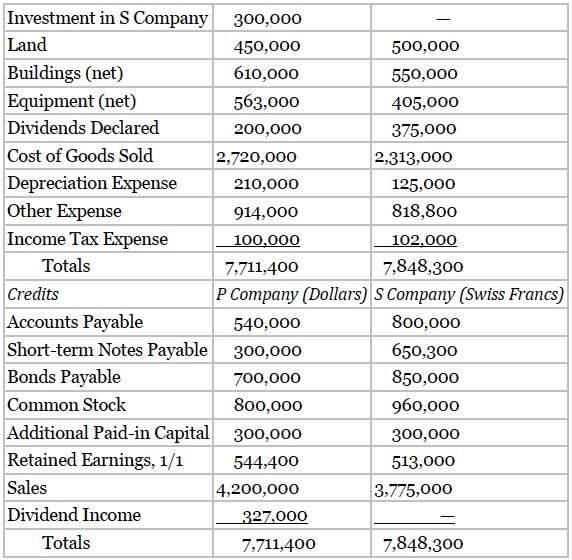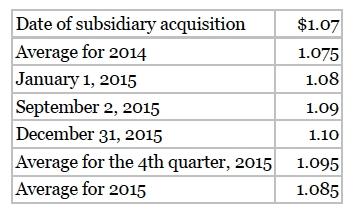Question
On January 2, 2019, Potter Company, a U.S.-based company, acquired for 2,000,000 francs an 80% interest in Slytherin Company, a Swiss company. On January 2,
On January 2, 2019, Potter Company, a U.S.-based company, acquired for 2,000,000 francs an 80% interest in Slytherin Company, a Swiss company. On January 2, 2019, Slytherin Company reported a retained earnings balance of 480,000 francs. Slytherins books are maintained in Swiss francs and are in conformity with U.S. generally accepted accounting principles. Trial balances of the two companies as of December 31, 2020, are presented here:


Other information related to the subsidiary follows:
1. Beginning inventory of 830,000 Swiss francs was acquired when the exchange rate was $1.078.
2. Purchases made uniformly throughout 2020 were 2,520,000 francs.
3. The Swiss franc is identified as the subsidiarys functional currency.
4. The subsidiarys beginning (1/1/20) retained earnings and cumulative translation adjustment (credit) in dollars were $175,948 and $390,691 respectively.
5. All plant assets were acquired before the parent obtained a controlling interest in the subsidiary.
6. Sales are made and all expenses are incurred uniformly throughout the year.
7. The ending inventory was acquired during the last quarter.
8. The subsidiary declared and paid dividends of 375,000 francs on September 2.
9. The following direct exchange rate quotations were available:

Required:
1. Convert the accounts of the foreign subsidiary, assuming that the U.S. dollar is the functional currency of both companies. For this problem assume that the subsidiarys beginning (1/1/20) retained earnings balance in the translated balance sheet is $551,055.
2. Prepare a schedule to verify the translation gain or loss, assuming a 637,000 Swiss franc net exposed liability position at the beginning of the year.
Debits Cash Accounts Receivable Inventories (FIFO cost) P Company (Dollars) S Company (Swiss Francs) 500,200 962,500 516,400 660,000 627,800 1,037,000 Investment in S Company 300,000 Land 450,000 500,000 Buildings (net) 610,000 550,000 Equipment (net) 563,000 405,000 Dividends Declared 200,000 375,000 Cost of Goods Sold 2,720,000 2,313,000 Depreciation Expense 210,000 125,000 Other Expense 914,000 818,800 Income Tax Expense 100,000 102.000 Totals 7,711,400 7,848,300 Credits P Company (Dollars) S Company (Swiss Francs) Accounts Payable 540,000 800,000 Short-term Notes Payable 300,000 650,300 Bonds Payable 700,000 850,000 Common Stock 800,000 960,000 Additional Paid-in Capital 300,000 300,000 Retained Earnings, 1/1 544,400 513,000 Sales 4,200,000 3,775,000 Dividend Income 327,000 Totals 7,711,400 7,848,300 $1.07 1.075 1.08 Date of subsidiary acquisition Average for 2014 January 1, 2015 September 2, 2015 December 31, 2015 Average for the 4th quarter, 2015 Average for 2015 1.09 1.10 1.095 1.085Step by Step Solution
There are 3 Steps involved in it
Step: 1

Get Instant Access to Expert-Tailored Solutions
See step-by-step solutions with expert insights and AI powered tools for academic success
Step: 2

Step: 3

Ace Your Homework with AI
Get the answers you need in no time with our AI-driven, step-by-step assistance
Get Started


